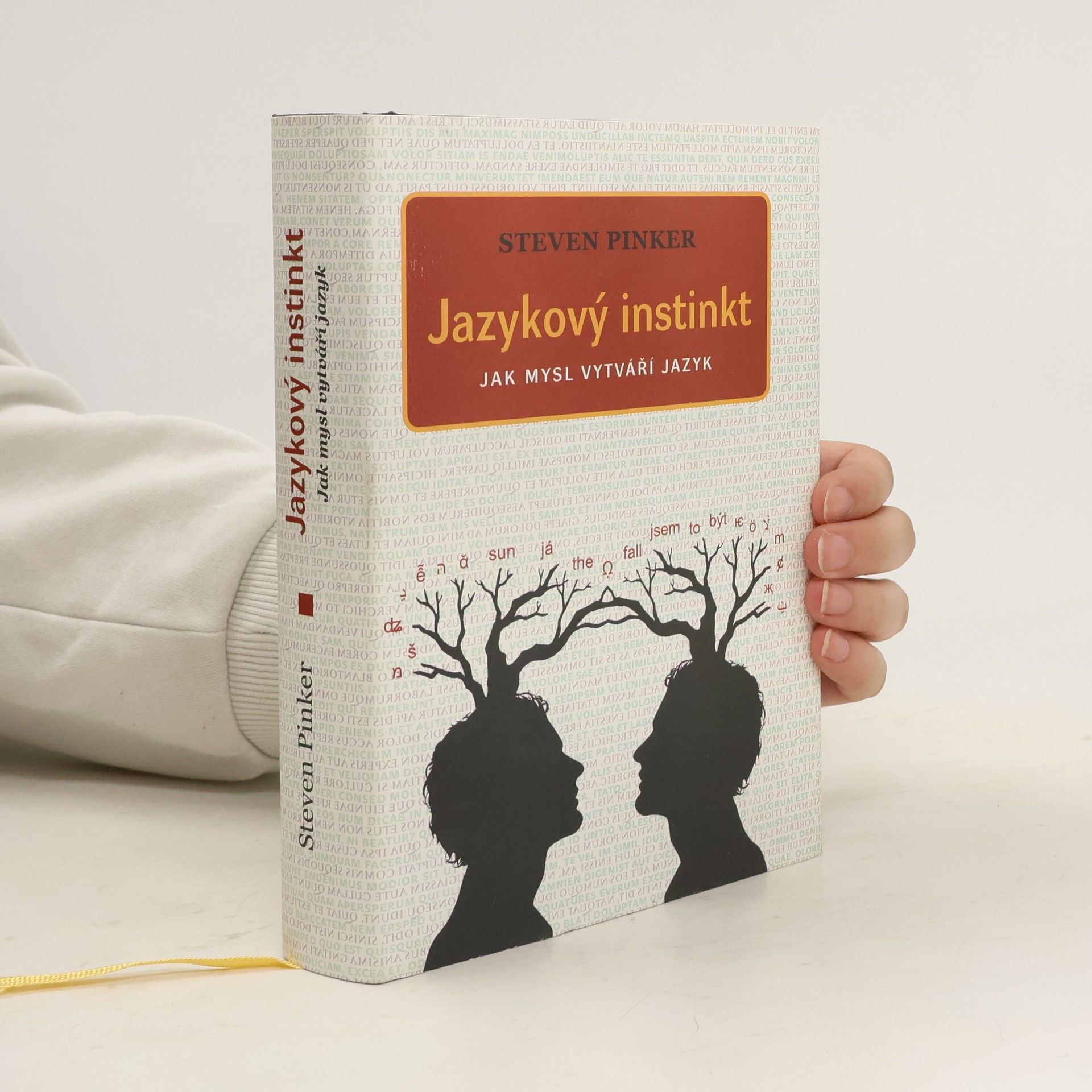V knize navazující na úspěšné starší dílo Lepší andělé naší přirozenosti si psycholog, lingvista a vědecký popularizátor Steven Pinker vytyčil ambiciózní cíl: Oživit neprávem zapomínané i zatracované osvícenské ideály rozumu, vědy, humanismu a pokroku, znovu je zformulovat v jazyce a pojmech 21. století a připomenout, že právě těmto ideálům lidstvo vděčí za nebývalý rozkvět v posledních 200 letech. Řadou překvapivých statistik opět dokládá, že navzdory všeobecné skepsi prožíváme nejskvělejší éru lidské historie; svým typickým svěžím stylem s množstvím zábavných citací napříč dějinami filozofie, kultury i popkultury se však zamýšlí i nad aktuálními hrozbami a nad osvícenským přístupem k jejich řešení.
Steven Pinker Knihy
Steven Pinker je přední kanadsko-americký experimentální psycholog a kognitivní vědec, známý svým širokým zkoumáním lidské přirozenosti a jejího vztahu k jazyku, historii, morálce a politice. Jeho práce se zaměřuje na jazyk a kognici, přičemž obratně proplouvá komplexními tématy s jasností a pronikavostí. Pinkerova odvážná zkoumání zpochybňují běžné představy a vybízejí čtenáře, aby přehodnotili své chápání lidského chování a pokroku. Prostřednictvím svého psaní se snaží osvětlit mechanismy mysli a důsledky poznání pro společnost.







Kniha Jazykový instinkt oceňovaného experimentálního psychologa a kognitivního vědce Stevena Pinkera pojednává o tom, jakým způsobem si lidé osvojují rodný či další jazyk a co to vůbec znamená. Svůj postoj zakládá na popularizaci revolučních myšlenek amerického filozofa Noama Chomského týkajících se jazyka jako vrozené schopnosti mozku a rozvíjí je kontroverzní tezí, že my jako lidský druh vlastníme evoluční mentální modul pro tuto schopnost. Jazyk je vrozený instinkt a všechny jazyky na světě prokazují známky jediné univerzální gramatiky jediného jazyka mysli, neboli vrozené „mentálštiny“. Na té děti zakládají učení se rodnému jazyku, což Pinker vysvětluje mnoha příklady z výzkumů, kdy se děti projevují znalostmi jazyka, které se nemohly naučit pouhým poslechem dospělých. Navíc sděluje svůj názor ohledně role vrozenosti a kultury, co myslí pojmem „univerzální lidé“, rozebírá význam termínů „hloubkové“ a „povrchové struktury“, postuluje svůj názor na instituce zabývající se hlídáním stavu a čistoty jazyka a jazykové znalce, odpovídá na nářky o zkaženosti a úpadku jazyka a obhajuje slang poukazem na jeho bohatost a expresivnost.
Jak funguje jazyk a jak se učíme mluvit? Proč se jazyky během doby mění a proč mají tolik zvláštností a nepravidelností? Tyto a další záhady jazyka odhaluje autor bestselleru Jazykový instinkt, Steven Pinker. Na příkladu pravidelných a nepravidelných anglických sloves autor propojuje oblast přírodních a humanitních věd: historii jazyků, Chomského teorie o jazyku a jejich kritiku, pokusy vytvořit jazyk počítačovou simulací nervových sítí, jak se děti učí gramatické „chyby“, moderní techniky identifikace genů a zobrazení mozku či největší myšlenky z historie západní filozofie.
Enlightenment now : the case for reason, science, humanism, and progress
- 576 stránek
- 21 hodin čtení
Is modernity really failing ? Or have we failed to appreciate progress and the ideals that make it possible ? If you follow the headlines, the world in the twenty-first century appears to be sinking into chaos, hatred and irrationality. Yet, Steven Pinker shows, if you follow the trendlines rather than the headlines, you discover that our lives have become longer, healthier, safer, happier and more prosperous - not just in the West, but worldwide. Such progress is no accident : it's the gift of a coherent and inspiring value system that many of us embrace without even realizing it. These are the values of the Enlightenment : reason, science, humanism and progress. In making the case for an Enlightenment newly recharged for the twenty-first century, Pinker shows how we can use our faculties of reason and sympathy to solve the problems that inevitably come with being products of evolution in an indifferent universe. We will never have a perfect world, but - defying the chorus of fatalism and reaction - we can continue to make it a better one.
The better angels of our nature : why violence has declined
- 802 stránek
- 29 hodin čtení
A controversial history of violence argues that today's world is the most peaceful time in human existence, drawing on psychological insights into intrinsic values that are causing people to condemn violence as an acceptable measure.
What is the truth about human nature? Steven Pinker argues that our usual explanations of human behaviour - stated most clearly in the human sciences of psychology, ethics and politics - tend to deny what is now undeniable: the role of an inherited human nature.
The sense of style : the thinking person's guide to writing in the 21st century
- 368 stránek
- 13 hodin čtení
What is the secret of good prose? Does it matter in an age of digital media? In this witty, mind-expanding book about the art and science of writing well, Steven Pinker shows that good style isn't just about rules - it's about empathy, coherence and adding beauty to the world. 'Witty, direct and idiosyncratic . . . often laugh-out-loud funny . . . refreshingly uncensorious . . . It helps enormously that he is such a beautiful stylist himself.' Paula Byrne, The Times 'Wonderful . . . No true lover of this chaotic, unregulated, magnificently vital language could fail to thrill.' Christopher Hart, Sunday Times 'Brainy, funny . . . a comedy of linguistic bad manners.' Peter Conrad, Guardian 'Outstanding . . . the one book I can unreservedly recommend as a guide on how to write well . . . unique as well as brilliant.' Oliver Kamm, The Times
How the Mind works
- 660 stránek
- 24 hodin čtení
A prominent cognitive scientist and author of The Language Instinct explains how the brain evolved to store and use information, allowing our ancestors to control their environment, and why we think and act as we do. 50,000 first printing.
Das unbeschriebene Blatt
Die moderne Leugnung der menschlichen Natur
Mit einem aktuellen Vorwort zur Neuausgabe! Auf John Locke geht die Vorstellung zurück, der Mensch sei ein leeres Blatt, auf dem im Verlauf des Lebens die persönlichen Erfahrungen eingetragen werden. In seinem mittlerweile klassischen Buch »Das unbeschriebene Blatt. Die moderne Leugnung der menschlichen Natur« bezieht Bestseller-Autor Steven Pinker ganz die Gegenposition: Mit Witz, Brillanz und Gelehrsamkeit analysiert er die Geschichte dieser Idee und zeigt, wie falsch sie ist – mit allen kruden Auswirkungen auf Vorstellungen von Sexualität, Rasse, Kindererziehung, Intelligenz usw. Die Rolle der Gene wird systematisch unterschätzt; aber das bedeutet nicht, dass wir ihnen völlig ausgeliefert sind. Pinker zeigt nämlich auch, wie befreiend diese Sichtweise sein kann. Ein unterhaltsames und anschauliches Buch zur Natur des Menschen, ein echter Lesegenuss.
Language, Cognition, and Human Nature
- 392 stránek
- 14 hodin čtení
Collects for the first time Steven Pinker's most influential scholarly work on language and cognition. Pinker is a highly eminent cognitive scientist, and these essays emphasize the importance of language and its connections to cognition, social relationships, child development, human evolution, and theories of human nature.



